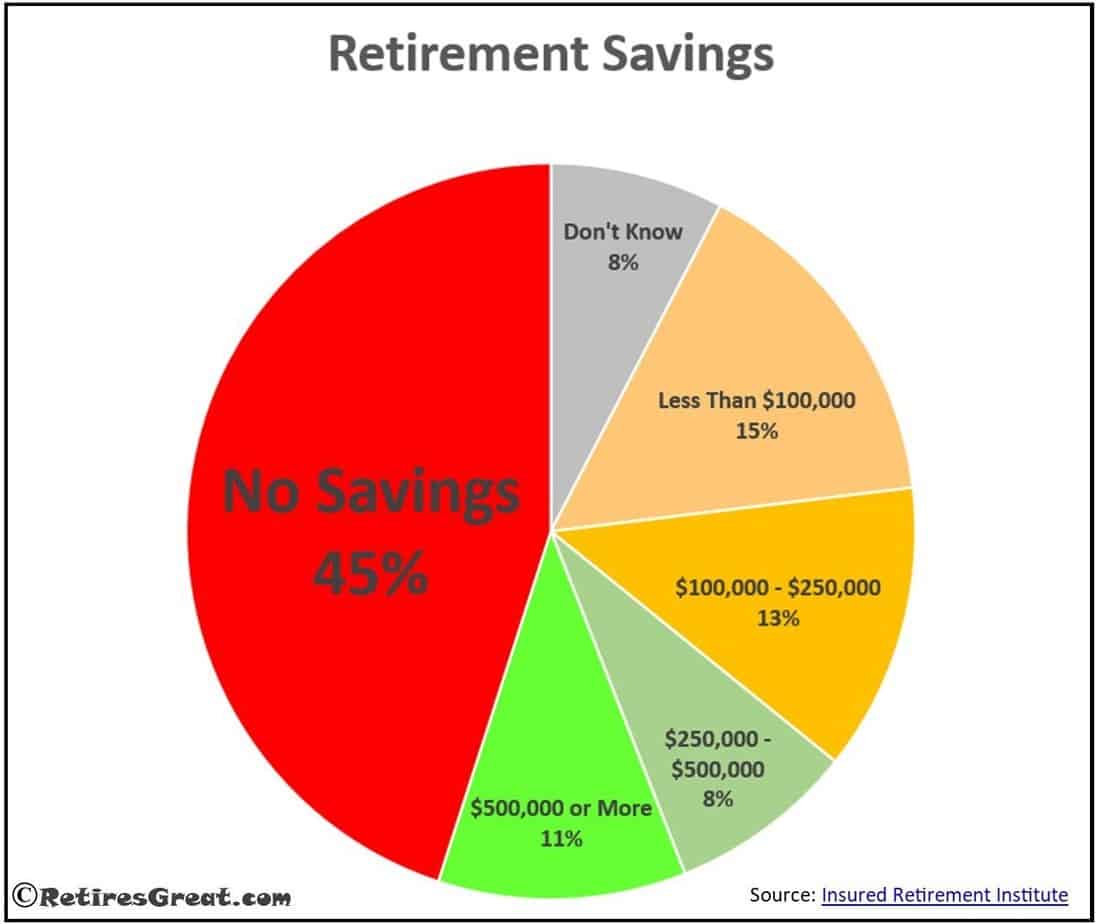The average American starts seriously thinking about retirement once they’re in their mid 50s. At this point, many are playing catch up and make mistakes which will rob them of their future happiness.
The 8 most common retirement mistakes boomers should avoid include:
The general consensus of retirees is they did the best they could based on what they knew. Almost everyone, if they’re honest with themselves, will admit there were things they wish they’d done differently.
1. Failure To Create a Retirement Plan
The number one way to sabotage what should be the best years of life is failing to plan for it. The majority of baby boomers got so caught up in the hustle and bustle, they never thought about what they want their retired life to be like.
The greatest retirement fallacy is that saving enough money ensures a good retirement. This, coincidentally, is precisely the message reinforced throughout the financial planning community.
While financial independence is critical, there’s far more to consider than just savings alone. In fact, how much needs to be set aside will vary based on each person’s needs and expectations. A retirement plan should include:
Lots of moving parts and the best way to address them is by creating a roadmap. How to Write a Retirement Plan provides greater insights into crafting a workable strategy.
In addition, it should be updated on a regular basis as your needs and desires evolve and change.
2. Not Maximizing Savings
Maximizing savings during your final working years is of paramount importance. This period is, usually, when your income is at its highest point and expenses should be going down.
By this, I mean the mortgage should be paid off (or close to) and the kids are on their own. Even those who have diligently saved over the years will want to maximize their savings as this is the home stretch.
According to the Internal Revenue Service (IRS), individuals can contribute up to $20,500 in 2022. If you’re 50 or older, an additional $6,500 is allowed as a catch-up contribution.
Unfortunately, the reality is about 45% of baby boomers have no retirement savings!

The root of the problem is more than 60% of Americans live paycheck to paycheck. Any unexpected expense will knock them for a loop. The scarier part is around half of them report household incomes in excess of $100,000.
Failure to maximize savings is one of the most crucial retirement mistakes boomers should avoid. While no one can go back in time, those final working years become critical.
3. Poor Investment Strategies
There’s nothing straightforward or simple about investing!
Unless you’re a financial guru or take the initiative to educate yourself, you’re vulnerable to making poor decisions. Even well-meant advice from family or friends may hinder your investment strategy.
Some examples include:
Even though it’ll cost some money, a good financial advisor can assist with putting together a portfolio which meets your needs.
4. Missing Out on Employer Benefits
As unbelievable as it sounds, one in four workers don’t take full advantage of their employer’s matching 401(k) contribution. The most common matches are fifty cents on the dollar up to a maximum of 6% of the employee's pay.
Generally, these are done via payroll deduction, making it relatively painless to contribute. The downside is they tend to be mutual funds, often, with less than stellar returns and high management fees.
Nevertheless, the employer contribution is free money!
Certain organizations may offer employee stock ownership or other profit-sharing plans. Such strategies have been found to enhance employee engagement, increase productivity and even reduce turnover.
From an employee perspective, this can be an excellent means of investing. Again, usually done through payroll deduction. If the stock increases in value, it could grow into a sizeable fund. The only drawback would be a lack of diversification.
A final word, be aware some employer benefits require a vesting period for eligibility. These could influence your decision of changing employers or your retirement timing.
5. Racking Up Debt
One of the worst things possible is racking up debt. With over 20% interest rates, credit card debt is like being mired in quicksand. If you can’t address it while working, how are you going to manage it when you no longer have a paycheck?
As crucial as it is to save, even more imperative is getting rid of high interest debt. Ultimately, it might require deferring your planned retirement date and / or living a more frugal lifestyle.
In extreme situations, debt counseling and consolidation might be necessary. Also alarming is the rising trend in the number of seniors filing for bankruptcy. This underscores the need to keep expenses under control.
As a society, we’re conditioned to buy the latest and greatest products. The American love affair with automobiles is an excellent example. In fact, a new vehicle is one of the biggest expenditures and worst possible investments.
To be blunt, the moment you drive it off the lot, it has already started depreciating. Come hell or high water, many would be retirees are planning on upgrading to a new vehicle while they still have a paycheck.
In spite of the cost, this isn’t necessarily a bad thing. A new vehicle should provide years of safe and reliable transportation. Especially if your current one is starting to nickel and dime you to death.
Our article, Should You Buy a New Car Before Retirement, further explores this phenomenon. The age-old adage of "living within your means" remains true to this day.
6. Underestimating Medical Expenses
Another of the retirement mistakes boomers should avoid is underestimating medical expenses. According to Fidelity Retiree Health Care Cost Estimate, a 65+ year old couple can expect to pay $300,000 in health care costs throughout their retirement.
According to the American Medical Association, healthcare spending increases by about 4.5% every year. In 2019, $3.8 trillion was spent on healthcare or over $11,000 per person. With an aging population, these costs will continue to spiral upwards.
Contrary to popular opinion, Medicare isn’t free and is only basic coverage. For a cost, optional coverage is available for prescriptions, dental, vision, hearing and so on.
Critical and time sensitive decisions need to be made at time of enrollment and our article, Medicare Enrollment Simplified, unravels the many complexities.
In addition, a Health Spending Account (HSA) can be a tax effective means of preparing for any out-of-pocket medical costs.
Long-term care insurance can be a contentious issue. Not only expensive, there’s no guarantee you’ll need it. But, if you or your spouse do require extended care, likely, it'll financially wipe you out.
An interesting alternative to consider is long-term care in Mexico. It's a fraction of the cost with higher quality care which our article, Reasons to Retire in Lake Chapala, touches upon.
7. Making Rash Decisions
The early years of retirement are often characterized with higher levels of spending. These are the “go years” when you’re young and healthy enough to do all those things you’ve always wanted.
This is, also, the period when rash decisions can be made which might later be regretted. Examples could include:
This isn’t to suggest any of these are necessarily bad decisions. Rather, my intent is raising the point of ensuring you're doing what's right for you. When it comes to big expenditures, it’s advisable to try before you buy.
One of the greatest benefits of creating a retirement plan is preventing rash decisions. In addition, you want to avoid underspending and not enjoying retired life.
8. Underspending and Not Enjoying Retired Life
The other extreme is living a miserly existence and not enjoying the fruits of your labor.
After decades of scrimping and saving, old habits are difficult to break. In fact, giving yourself permission to spend more freely might be the most difficult thing you’ve ever done.
Compounding this issue is the underlying fear of outliving your savings. No one knows what the future will bring with a rising cost of living and sky rocketing medical expenses.
Our article, How to Deal with Fear of Retirement, addresses these concerns.
One heart-warming story I observed occurred on a Caribbean cruise several years ago. A retired teacher included her elderly mother and son on this luxurious vacation. What a fantastic way to create new memories and share precious family time!
This, in part, inspired us to compile 21 Fun Things to Do with Elderly Parents.
Closing Thoughts on Retirement Mistakes Boomers Should Avoid
Everyone looks forward to retiring and enjoying all the things they’ve wanted for so long. However, there are common mistakes and pitfalls that should be avoided.
Any one of these could throw a wrench into your future happiness and ruin what should be your golden years. In my opinion, most important is envisioning what you want and, then, creating a realistic plan.
Your final working years can greatly influence your future quality of life. After crossing the finish line, it’s too late to make up for lost time.
Now, the challenge is to make the most of life and enjoy everything you’ve worked so hard for. It’s completely up to you what the next 20 to 30 years will look like.

